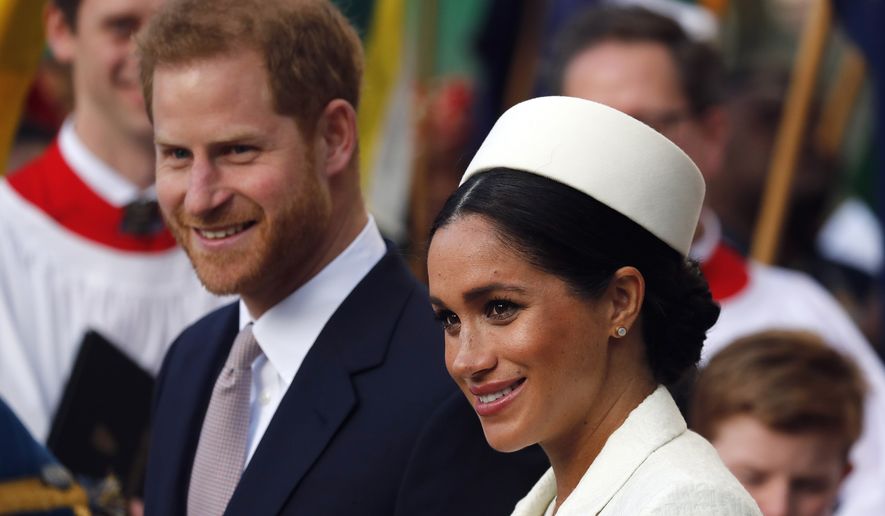OPINION:
I met a British journalist living in NYC today and, of course, our conversation turned to Meghan Markle. He shared that he was astonished to learn a large segment of America is critical of American-born Meghan, considering the news headlines here and around the world, that bigotry hounded her out. I told him I was among that segment, and that as an American who devotes his life to commenting on U.S.-U.K. relations, I was embarrassed that an American had brought such strife to the Windsors. Indeed, the public’s opinions of this event correlate strongly with the identity issues that confront — and paralyze — society today in America, Britain and well beyond.
Particularly troubling has been the off-base but completely predictable fable spun by the woke in the Twittersphere and the global media that Meghan was run out of Britain by bigots and racists. Considering the welcoming reception by the royal family and the British people that Meghan received throughout her romance and then marriage, with Prince Harry, this nonsense is particularly offensive. The race activists are totally blind to the reality that Meghan’s failures are owing, not to her color or heritage, but rather to her celebrity lifestyle and hunger for personal publicity and financial advancement — all in complete discord with the behavior of the royal family.
Many in Britain and around the world celebrated a “progressive” royal couple who championed the wokest of identity issues, including race and gender equality. And when the stuff hit the fan, after the Sussexes revealed (on Instagram) their wish list for their future, outlining their demands, on their terms, those same supporters blamed the downfall of the couple, on (what else?) bigotry and misogynism against the biracial Meghan.
In words that will inspire Hollywood award ceremonies this year, British author Afua Hirsch wrote for The New York Times: “racist treatment of Meghan,” which “proved what many of us have always known: no matter how beautiful you are, whom you marry, what palaces you occupy, charities you support, how faithful you are, how much money you accumulate or what good deeds you perform, in this society racism will still follow you.”
Of course CNN dove in with: “Coming or going, Meghan gets the blame — and it’s because of her race.” Blind to the fact that Meghan’s performance as a “working royal” paled in comparison to other royal family members (Princess Anne worked 167 days to Meghan’s 31), the U.S. mainstream media cannot see any reason other than skin color for the Sussexes’ implosion.
Even the electorally-decimated left-wing U.K. Labor Party got in on the act with biracial MP Clive Lewis blaming Megxit on “structural racism and sexism” rather than the duchess’ lack of aptitude for, or interest in her royal responsibilities. Mr. Lewis told Sky News: “We can see it with Meghan Markle and the way that she’s been treated in the media. … After 400 years of racism, you can’t just overturn it overnight.”
There is an unbridgeable chasm between the example of Queen Elizabeth’s reign and the Sussexes’ future aspirations. Celebrities and monarch’s share one very important aspect of convergence: popularity. But the similarity stops there. Celebrities boost their sponsorship opportunities, film ratings and Instagram followers by bashing President Trump at the Oscars, kneeling during the national anthem or setting up charities that benefit themselves more than the cause. By contrast, royals survive and prosper by casting a light on others’ achievements rather than their own, by celebrating national occasions, championing their nation abroad and providing comfort to others during tragedies.
Prince Harry certainly learned from the best, and this makes his withdrawal all the more painful. Still at 93, his grandmother, Queen Elizabeth II, remains beloved by her people because she expertly fulfills a pledge she made in 1947: “I declare before you all that my whole life, whether it be long or short, shall be devoted to your service and the service of our great imperial family to which we all belong.”
As senior members of the royal family, the Sussexes were representatives of the spirit of service, honor and duty exemplified by the queen. Clearly, they rejected this life and that is in their right to do. So, too, like all members of the royal family, they experienced the glare of media scrutiny. That, too, is part of the job. But it is unimaginable that the queen, Prince Philip or Princess Anne would ever share publicly as did Meghan, “not many people have asked if I’m ok.”
Therein lies the problem. In Meghan’s mind, it’s all about her, while service is all about others. The queen and millions of her subjects have grasped that royal duty is not among Meghan’s gifts. So too, many Americans like myself recognize that, though she is our own countrywoman, Meghan is not suited to a life of royal service. Like all of us, she is who she is, but her shortcomings are owing to her choices and motivations rather than to her skin color and, therefore, the implication that anyone who criticizes her is racist is absurd.
• Lee Cohen, a fellow of the Danube Institute, was adviser on Europe to the U.S. House of Representatives Foreign Affairs Committee and founded the Congressional United Kingdom Caucus.




Please read our comment policy before commenting.